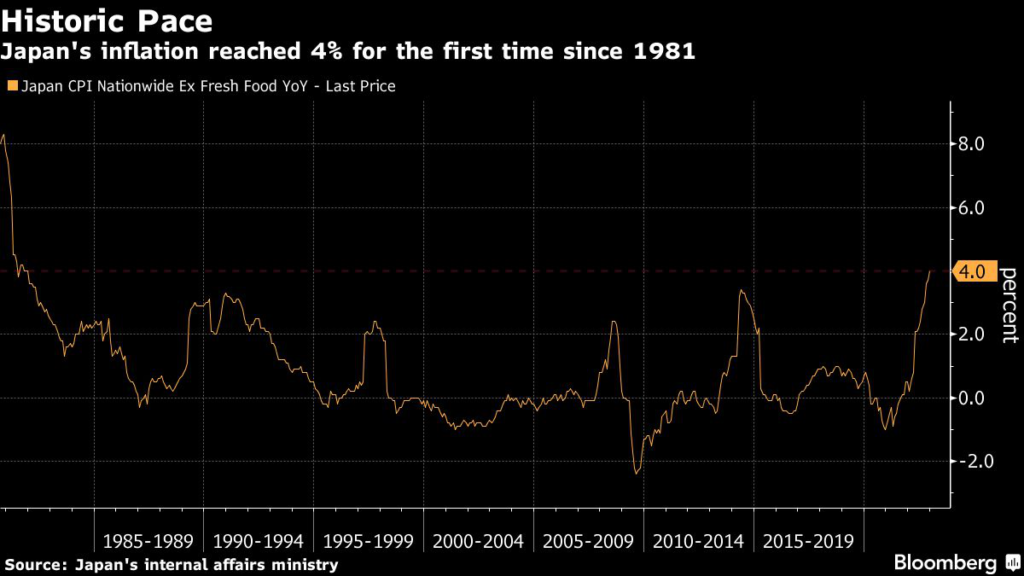The Bank of Japan should consider boosting flexibility in long-term yields as rising inflation risks call for securing more room for policy maneuvering, according to the International Monetary Fund.
(Bloomberg) — The Bank of Japan should consider boosting flexibility in long-term yields as rising inflation risks call for securing more room for policy maneuvering, according to the International Monetary Fund.
Options include raising its 10-year yield target, widening the yield trading band, switching back to a quantity goal for bond buying and aiming at a shorter-maturity yield, the fund said in an Article IV report published Thursday.
The fund made the recommendations amid “exceptionally high uncertainty” around inflation with risks tilted to the upside.
“The policy challenge in the near term is to ensure that the 2% inflation target is reached durably, without overshooting significantly,” the IMF said. “More flexibility in long-term yields would help to avoid abrupt changes later. This would help better manage inflation risks and also help address the side-effects of prolonged easing.”
The recommendations signaled the IMF’s unusually stronger tone for policy adjustment advice.
The fund had suggested shortening the yield target in previous reports, but the addition of the other options reflects persistent pressure for the BOJ to further loosen its grip on bond yields, as the side effects including falling market functionality and suppressed bank earnings mount.
From the IMF’s perspective, adding flexibility now would also help avoid abrupt policy changes down the road.
The fund said each potential move would require careful consideration: If the yield range is widened, it will need to be broad enough for market forces to play a key part. If it ditches the yield target in exchange for a quantity target, the BOJ will have to be ready to contain rapid yield spikes with bond buying. By targeting a shorter-term yield, the BOJ may face costly side-effects.
The upcoming selection of the new governor and two deputies is keeping market participants on their toes for any signs that would indicate whether the BOJ would shift from its decade-long unprecedented monetary easing. The December doubling of the yield band fueled speculation that the BOJ was finally moving in the direction of policy normalization like other major central banks.
The BOJ keeps its negative policy interest rate at -0.1% and the target for 10-year yields around 0%. BOJ Governor Haruhiko Kuroda, whose term is set to end in April, has repeatedly said widening the yield band wasn’t a step toward policy normalization.
“We think it’s most appropriate to target the shortest-term policy rate and the 10-year yield — the most representative long-term interest rate — and keep the entire yield curve in an appropriate form,” Kuroda said in a presser earlier this month. “It’s not that we won’t consider any changes at all, but that’s the basis of our thinking regarding the current yield curve control.”
The IMF sees more upside risks to inflation as the yen’s decline makes imports more expensive, the economy benefits from a recovery of inbound tourism and fresh stimulus measures, and wages could rise faster than expected. The BOJ should adjust its policy to enable long term yields to rise along the way should those forces materialize, according to the IMF.
“This could lead to a smoother transition to a neutral monetary stance once there is stronger evidence that the inflation target has been durably achieved,” the fund said.
“In the scenario that significant upside inflation risks materialize, monetary stimulus withdrawal will have to be much stronger — short-term rates may have to rise much earlier and above the neutral rate to anchor inflation back towards its 2% target,” the IMF said.
To be sure, the IMF isn’t calling for the end of the BOJ’s monetary easing. Overall, its policy stance should remain accommodative as Japan has yet to achieve its 2% inflation goal in a sustainable manner, the fund said. The IMF expects core inflation will fall back below 2% by the end of 2024 without robust wage growth after peaking in the first quarter of this year.
On other topics, the report made the following remarks:
- Japan should warrant more realistic scenarios when discussing medium-term fiscal targets
- Currency interventions should be limited to special circumstances such as disorderly market conditions, risks to financial stability because of sharp yen movements and concerns that currency movements could de-anchor inflation expectations
–With assistance from Toru Fujioka.
More stories like this are available on bloomberg.com
©2023 Bloomberg L.P.










